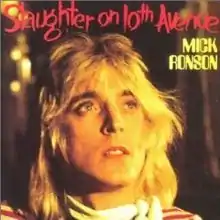Slaughter on 10th Avenue (Mick Ronson album)
Slaughter on 10th Avenue is the debut album by Mick Ronson, released in 1974.
| Slaughter on 10th Avenue | ||||
|---|---|---|---|---|
 | ||||
| Studio album by | ||||
| Released | February 1974 | |||
| Recorded | July 1973 | |||
| Studio | Château d'Hérouville, Hérouville, France; Trident, London | |||
| Genre | Rock, glam rock | |||
| Length | 35:19 | |||
| Label | RCA | |||
| Producer | Mick Ronson | |||
| Mick Ronson chronology | ||||
| ||||
| Singles from Slaughter on 10th Avenue | ||||
| ||||
For inspiration, Ronson relied on Annette Peacock's 1972 album I'm the One; he used the title track and her arrangement of Elvis Presley's "Love Me Tender". Two songs were co-written by Ronson with Scott Richardson, who had been involved in the Ann Arbor music scene since the mid-'60s and came to prominence as lead singer of the SRC. Richardson was brought into the Bowie camp by Angie Bowie, who met him through Ron Asheton of the Stooges. During the recording of the album, Ronson considered putting together a new band with Richardson, Aynsley Dunbar, and Trevor Bolder, to be called the Fallen Angels, but plans fell through.
Promotion and live shows
Mick Ronson's debut concert came at the Rainbow Theatre, London, with a pair of shows on 22–23 February 1974. His band consisted of Mark Carr-Pritchard on second guitar, Trevor Bolder on bass, Mike Garson on keyboards and Ritchie Dharma on drums. The band were augmented by Thunderthighs on vocals, a five-piece horn section and the London Symphony Orchestra. This was followed by a 13 date tour in April 1974 without the orchestra.
Reception
| Review scores | |
|---|---|
| Source | Rating |
| AllMusic | |
| Classic Rock | |
| Mojo | |
Dave Thompson of AllMusic praised the album, putting it on par with "any of Bowie's own" and describing it as a "snapshot of a special time, when the triple disciplines of glam, rock, and 'Precious Art' slammed into one another."[1] According to journalist Jim Irvin, "Ronno's best-selling solo set of '74 has exclusive Bowie songs, a cracking band and engaging ideas. But the mixes are odd, some tracks don't lift-off and his vocals lack a distinctive persona."[3] Classic Rock reviewer finds the album "a mixed blessing", too. Some songs sound dated and overblown, but Bowie's penned tracks are "slices of old-school camp given a no-nonsense twist."[2]
Track listing
All credits adapted from the original liner notes.[4][5]
- Side one
- "Love Me Tender" (George R. Poulton, Ken Darby) – 4:50
- "Growing Up and I'm Fine" (David Bowie) – 3:10
- "Only After Dark" (Mick Ronson, Scott Richardson) – 3:30
- "Music Is Lethal" (Lucio Battisti, English lyrics by Bowie) – 5:10
- Side two
- "I'm the One" (Annette Peacock) – 5:03
- "Pleasure Man / Hey Ma Get Papa" (Ronson, Richardson, Bowie) – 8:55
- "Slaughter on Tenth Avenue" (Richard Rodgers) – 4:41
Bonus tracks on selected CD editions
- "Solo on 10th Avenue – solo guitar sections" (Richard Rodgers) – 2:07
- "Leave My Heart Alone" (Craig Fuller) – 4:32 (Live 22–23 February 1974 at the Rainbow Theatre, London)
- "Love Me Tender" – 4:43 (Live 22–23 February 1974 at the Rainbow Theatre, London)
- "Slaughter on Tenth Avenue" – 4:35 (Live 22–23 February 1974 at the Rainbow Theatre, London)
Charts
| Chart (1974) | Peak position |
|---|---|
| Australia (Kent Music Report)[6] | 63 |
| United Kingdom (Official Charts Company) | 9 |
Personnel
- Mick Ronson – guitar, piano, vocals, arrangement, conductor
- Trevor Bolder – bass, trumpet, trombone
- Aynsley Dunbar – drums, percussion
- Mike Garson – piano, electric piano, organ
- David Hentschel – ARP on "Hey Ma Get Papa"
- Margaret Ronson – backing vocals
- Dennis MacKay – engineer, backing vocals
- Sidney Sax – strings
- Leee Black Childers – cover
References
- Thompson, Dave. "Mick Ronson – Slaughter on 10th Avenue review". AllMusic. All Media Network. Retrieved 9 September 2016.
- Bell, Max (February 2010). "Mick Ronson – Slaughter on 10th Avenue/Play Don't Worry". Classic Rock. No. 141. p. 90.
- Irvin, Jim (January 2010). "Mick Ronson – Slaughter on 10th Avenue". Mojo. No. 194.
- Slaughter on 10th Avenue (LP sleeve). Mick Ronson. RCA. 1974. APL 1-0353.CS1 maint: others (link)
- Slaughter on 10th Avenue (CD sleeve). Mick Ronson. Snapper Classics. 2003. SDPCD121.CS1 maint: others (link)
- Kent, David (1993). Australian Chart Book 1970–1992 (illustrated ed.). St Ives, N.S.W.: Australian Chart Book. p. 257. ISBN 0-646-11917-6.